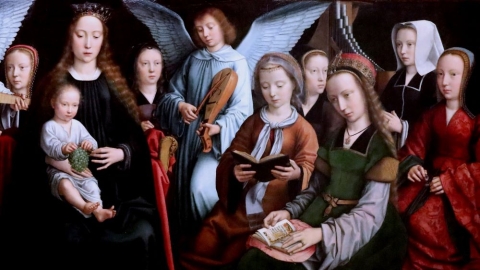The grace of God, our Savior, has appeared to all mankind

Nativité, Noël Coypel (1628-1707)
Commenting on these verses of the Epistle of Saint Paul to Titus, Bossuet invites us to contemplate the grace, the teaching and the hope contained in the mystery of the Nativity of Jesus Christ:
Apparuit enim gratia Dei salutaris omnibus hominibus erudiens nos, ut abnegantes impietatem et saecularia desideria sobrie et juste et pie vivamus in hoc saeculo, exspectantes beatam spem et adventum gloriae magni Dei et Salvatoris nostri Jesu Christi (Titus 2:11-13). “The grace of God our Savior hath appeared to all men: instructing us, that, denying ungodliness and worldly desires, we should live soberly and justly and godly in this world, looking for the blessed hope and coming of the glory of the great God and our Savior Jesus Christ."
The great Pope Saint Leo[1] teaches us that the works that a Saving God accomplished for our salvation are not only graces but also helps; that everything that redeems us speaks to us, and finally that all the mysteries are examples; so that the Christian must imitate everything that he believes.
Apparuit gratia Dei. In all the mysteries that God accomplishes for our salvation, there are always three things to consider. All the mysteries satisfy our desires by some gift, direct our behavior by some example, and stir up our hope by some promise. For everything that is accomplished in time has its relation to the next life; so that we must always consider the grace that the mysteries bring, the instructions that they give us, and the glory that they set before us. The Apostle omitted nothing, and leads the faithful onward step by step.
Apparuit gratia Dei Salvatoris nostri omnibus hominibus; here he sets before us the grace that the newborn Jesus brings us.
Erudiens nos; here he reveals to us the virtues that the newborn Jesus teaches us.
Exspectantes beatam spem; here he shows us the great and admirable spectacle that the newborn Jesus makes us await.”
-- Bossuet, Desultory Thoughts for the Christmas Octave
[1] Sermo XXIV, in Nativitate Domini.





